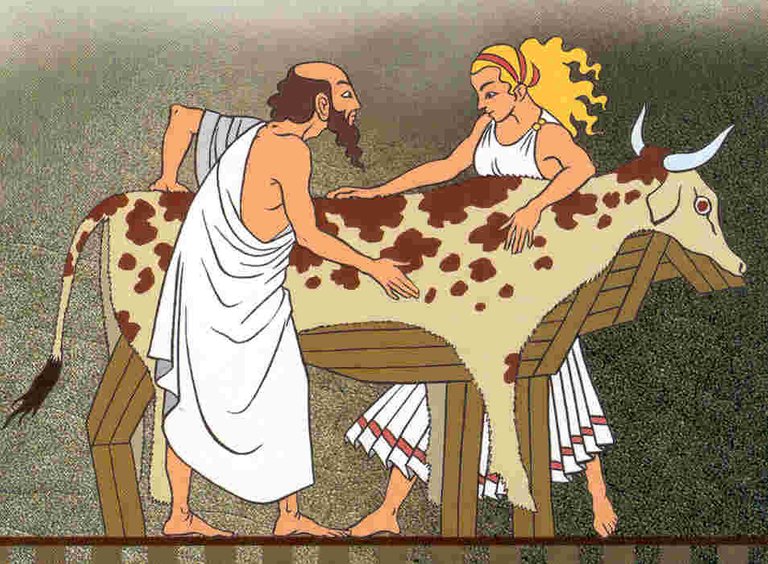Daedalus was an Athenian whose name means "Ingenious." He was exiled from Athens after attempting to murder his nephew Perdix, who at the age of twelve, was an incredibly intelligent youth.
After examining the backbone of a fish, Perdix was able to craft the first saw, by cutting teeth into an iron blade, using the fish backbone as the model. Enraged with jealousy for his nephew, Daedalus took Perdix to Acropolis, the temple of Minerva, Goddess of Wisdom.
Minerva was watching as Daedalus threw Perdix off a cliff, transforming Perdix into a partridge. Daedalus was exiled into Crete, the land of King Minos.
In the eighth book of Ovid’s Metamorphoses, Daedalus’s story begins after he has been exiled to Crete.
According to Ovid, Daedulus, growing weary of being stranded in Crete, devised a plan to escape. Since he couldn’t leave by land or sea, he decided the last means by which he could leave was the sky. As an artist and craftsman, he built a set of wings out of feathers and wax.
Upon building a set of wings, he fastened them to his son, Icarus, explaining to him that it is best not to fly to high, nor too low. Daedalus warned his son, fly too low and risk crashing into the sea; fly too high and be scorched by the sun. Icarus, however, was overcome by the excitement of flying, and as he rose higher into the sky, the wings began to melt.
Ovid says that Icarus waved his hands in vain attempt to stay in the air, but eventually crashed into the sea and drowned.
The wings are not the only invention that Daedalus is known for; before the death of Icarus, Daedalus fashioned a hollow wooden cow for Pasiphae to hide inside so that she could share her passion with Poseidon’s bull.
Afterward, Pasiphae gave birth to a beast that was half human and half bull called the Minotaur. Daedalus then created the labyrinth to house the Minotaur, as is mentioned in book six of Virgil’s Aeneid.
The Golden Mean
One philosophical idea that is related to the story of Daedalus and Icarus is the Golden Mean. The Golden Mean is a discussion that involves knowing one’s limits.
Often, the myth of Icarus is associated with pride and fall; soaring too high, getting too excited will lead to failure. In this sense the myth is a cautionary tale.
The theme of moderation is prevalent in this myth. Avoiding either extremes is best to success. Ignoring his father’s advice to stay mid-sky, not too low, not too high, Icarus expresses hubris, human pride and overconfidence in one’s abilities.
Overconfidence in the Artificial
What is also important to consider in the story of Daedalus with regards to Icarus is his overconfidence in the artificial. Daedalus has manufactured the wings that lead to his son’s death. He defies the laws of nature with artificial appendages to escape from Crete.
This idea is supported by the presence of the partridge that reproaches Daedalus as he buries his dead son. The partridge is also a reminder of Daedalus’s actions that resulted in such circumstances.

Increasing the Visibility of Original and Engaging Content
Like @Curie? Support by voting Curie as Witness! https://steemit.com/~witnesses
Join us in Discord https://discord.gg/G6RPUMu
REFERENCES
Adrian Mitchell - Shapeshifters: Tales from Ovid’s Metamorphoses
Jenny March - Cassell’s Dictionary of Classical Mythology
Homer - The Odyssey




You have been upvoted by the @sndbox-alpha! Our curation team is currently formed by @jeffbernst, @bitrocker2020, @jrswab & @teachblogger . We are seeking posts of the highest quality and we deem your endeavour as one of them. If you want to get to know more, feel free to check our blog.